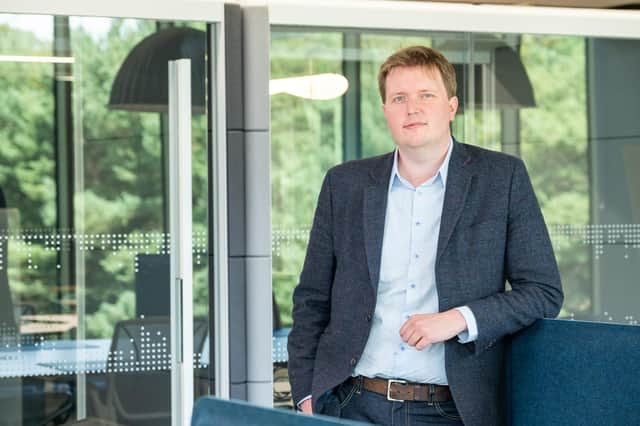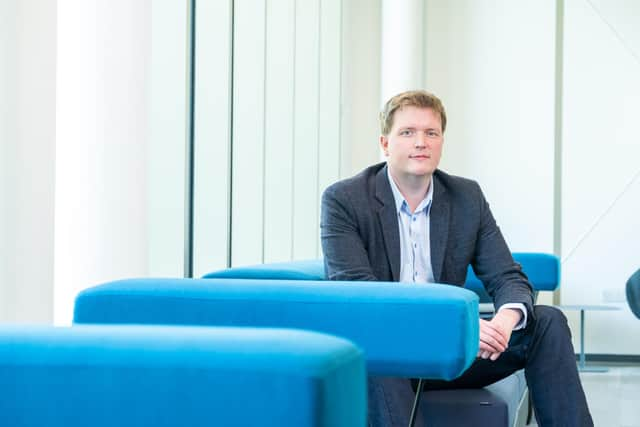The Big Interview: David Richardson, chief entrepreneurial executive at Heriot-Watt University


He has a background in informatics and computer science, started his career working for what was then known as Ernst & Young, and in his current role is driving the development of enterprise and entrepreneurship strategy.
What does your role entail and what are your goals, for example positioning Heriot-Watt as a globally leading entrepreneurial university?


Advertisement
Hide AdAdvertisement
Hide AdAs chief entrepreneurial executive, I lead the enterprise directorate, focusing on commercialising research, building strategic innovation-centric partnerships and helping companies collaborate with our students, staff and partners.
Research and enterprise is a core pillar within our strategy as we accelerate the commercialisation of pioneering research into practical applications and commercial outcomes that lead to growth and prosperity. The opportunities in this field are exciting and endless, and I have the privilege of working with brilliant people across disciplines, sectors and geographies.
With campuses in Scotland, UAE and Malaysia, our global network provides many exciting opportunities. A key goal is to expand our global innovation ecosystem, bringing people and organisations together to tackle pressing societal challenges and shape the economies of the future. I believe that attracting and nurturing international talent is the key to future prosperity.
You work with Heriot-Watt’s Global Research, Innovation and Discovery (Grid), home to the university’s Business & Enterprise Hub incubator. Can you give more detail on Grid’s progress and aims, including its global ambitions?
Our state-of-the-art Grid is designed to enable greater cohesion between academic research, business enterprise and entrepreneurial talent. Heriot-Watt has a rich heritage for pioneering research that focuses on the needs of industry, and Grid aims to take this to the next level by bringing together leading talent and the brightest minds to tackle industry challenges, pioneer new innovation and support companies to scale.
Grid offers something distinct. We bring together computing, mathematics and engineering alongside business enterprise, and embrace a “learn by doing” philosophy. This includes the space to incubate companies that range from small start-ups to larger corporations.
We established our first physical centre in 2019 in Edinburgh and aim to expand the model across our other campuses, including Dubai where we are about to open a new campus. We adopt a strong partnership approach and collaboration is at the heart of what we do.
From a Scottish perspective, the diversity of Heriot-Watt’s rural, city and island locations provide real opportunities to connect into our communities and create test beds to drive rapid experimentation and commercialisation.
Advertisement
Hide AdAdvertisement
Hide AdSo far, we’ve worked with companies like Celestia, a satellite antenna developer that recently secured £2.5 million of research and development (R&D) funding and is creating 18 jobs; Farm-Hand, an agritech start-up that is developing precision irrigation control systems; and Alana, a conversational artificial intelligence (AI) specialist formed by Heriot-Watt researchers.
Grid is also home to Converge, the only programme of its kind, uniting academic entrepreneurs from every university in Scotland.
How much has this been affected by Covid-19?
Since inception, Grid has had a strong focus on digital technology, which has enabled us to move from a physical workplace to a virtual one within a short space of time.
It’s an extremely challenging time for many people, especially students entering the job market, which is why we launched The Future Made for Success programme this summer. Developed in collaboration with the Edinburgh Business School, it’s designed to help our students gain valuable enterprise skills, enhance their employability, and gain commercial awareness through virtual industry challenges.
We recently launched a Prospectus for Recovery and Growth, which sets out key initiatives and commitments to help build a positive, lasting contribution to the communities in which we operate. Inspiring our students, academics and start-ups to be ambitious, resilient and enterprising, it makes the most of our global campuses and networks, which will play a key role in our recovery.
More broadly, what role do you think entrepreneurship and innovation have to play in helping Scotland navigate its way through the impact of the pandemic?
Many start-ups were formed in times of crisis. WhatsApp, Uber and Slack all came out of the Great Financial Crisis of 2007-2008.
Innovation will play a significant role in helping Scotland to recover from the pandemic. During 2020, we’ve seen the rapid adoption of digital technology, an explosion of new data and a rethink on what our future world might look like.
Advertisement
Hide AdAdvertisement
Hide AdGlobal supply chains have experienced major disruption and many organisations have had to adapt quickly. We are likely to see increasing levels of automation with many more applications for robotics and AI.
Many governments around the world are looking to stimulate their economies through investment in sustainable technologies. Energy transition is a major trend and will require new infrastructure, skills and innovation.
Innovation is changing the way in which we educate, and schools and universities have faced major disruption. With a new wave of digital technologies, such as augmented reality, we are likely to see new forms of immersive learning that allow people to connect anywhere on the planet.
Can you summarise how your career progressed before your current role – were you always interested in technology?
I’ve always had a passion for technology and innovation, and hold an MSc in research and a BEng in software engineering from the University of Edinburgh. While studying, I started a company that utilised location-based technology in mobile devices, before mobile apps had really taken off and the iPhone didn’t exist.
I started my professional career within technology and risk services at Ernst & Young, working with large corporate organisations on data analytics and security-related engagements. In 2007, I returned to the University of Edinburgh to lead business development activities within the School of Informatics.
A big focus was building partnerships with large tech companies and commercialising research. I subsequently led the successful bid to establish a national data science innovation centre – The Data Lab where I served as interim chief operating officer. AI and data science has seen tremendous growth in recent years and a lot of my time has been spent on developing a diverse range of industry, public sector and academic partnerships.
I later returned to informatics where, as director of partnerships, I worked with organisations such as the Alan Turing Institute and the late Professor Jon Oberlander to create and secure funding of the Bayes Centre. Over the years, I’ve worked with many early-stage technology companies and several global corporates that span Europe, USA and Asia.
Advertisement
Hide AdAdvertisement
Hide AdYou have a focus on technological innovation and commercialisation – how can this help drive economic growth?
Technology and engineering have transformed the modern world and have significant potential to change things for the better. With more focus on commercialisation and entrepreneurship, we can capture more of that value to create new well-paid jobs, more profitable companies and increased tax revenue that can be invested in public services.
While big challenges lie ahead, so do big opportunities. Innovation is typically spontaneous and involves skills and expertise that are cross-disciplinary. That’s why a big part of our focus with Grid is connecting talent.
Business and creativity are also essential. At Heriot-Watt, we specialise in some very technical areas such as robotics and autonomous systems, energy transition, quantum and photonics, alongside shaping highly creative talent within areas such as textiles and design.
There are tremendous opportunities to use technologies to enable new forms of collaboration such as augmented and virtual reality. This is an area in which I was working more than a decade ago but, with Covid-19, we’ve seen many organisations look for solutions to connect and collaborate in a more immersive way with their customers and employees. Showcasing the “art of the possible” is a really important part of sharing the vision, particularly with larger-scale innovation that will drive complex areas such as energy transition.
What is your view on the digital skills gap – how much have things progressed and what still needs to be done to bridge this?
Covid-19 has exacerbated the need for digital upskilling and reskilling. If we want a thriving economy, we must ensure that people are data-savvy, connected and able to use technology to interact and conduct their daily lives.
For Scotland to prosper, we must prioritise the development and attraction of talent. A recent study from Microsoft revealed that innovative organisations that are investing more in growing capabilities and skilling initiatives are more resilient and likely to recover faster.
Advertisement
Hide AdAdvertisement
Hide AdMore collective action across government, tech companies, employers and education-providers can help to close the gap.
At Heriot-Watt, our graduate apprenticeship programme is a leader in work-based learning and our undergraduate, postgraduate and MBA programmes provide many ways to engage with industry and equip students for the future.
How would you like Heriot-Watt to be placed as a global entrepreneurship hub say two years from now?
I want us to be in a position where we have a strong pipeline of opportunities that lead to more start-up activity that can benefit our students, staff and communities. I also want us to be the place where pioneering innovators and business minds thrive.
Our vision is to develop our existing Research Park into a dynamic and inclusive global ecosystem, focused on advancing R&D, talent development, commercialisation and start-up ventures. Consequently, attracting more companies to establish a base in Scotland, creating job opportunities, driving economic growth and future prosperity.
We are currently embarking on a number of flagship initiatives that include the new National Robotarium, which will bring together our robotics and AI expertise. We have also extended Grid’s reach through new partnerships.
I hope we are well on the way to recovering from the damaging health and economic impact incurred from Covid-19. Bringing people together through physical and virtual interaction is vital.
A message from the Editor:
Thank you for reading this article. We're more reliant on your support than ever as the shift in consumer habits brought about by Coronavirus impacts our advertisers.
If you haven't already, please consider supporting our trusted, fact-checked journalism by taking out a digital subscription.
Comments
Want to join the conversation? Please or to comment on this article.